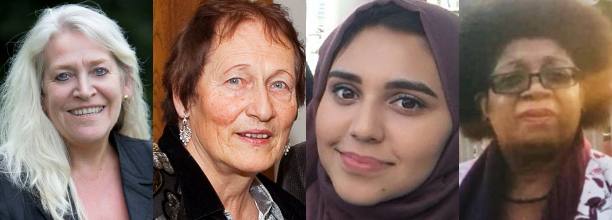JtoJ members share their personal responses to the killing of George Floyd and Black Lives Matter

Poems and an article by Dr Velma McClymont in response to the Black Lives Matter movement
“Dr Velma McClymont is a writer, community advocate and an international speaker. Moved by the murder of George Floyd, and in response to Black Lives Matter‘s global call for racial justice, she is writing a collection of protest poetry for publication.” You can read some of them here.
Six generations removed from my enslaved ancestors who toiled in “Britain’s sugar gardens” in Jamaica, I seized the chance to honour them by writing a short article on Britain’s role in the transatlantic slave trade. Read more
Pentimento and Black Lives Matter
Distinguished Professor Sharon Monteith discusses layers of historical injustice in the context of civil rights. Written on June 5th, 2020.
https://www.ntu.ac.uk/about-us/news/news-articles/2020/06/expert-blog-pentimento-and-black-lives-matter
Reflections on Racism
Read the article by Ruth Barnett here
Reflections on toxic legacies
JtoJ member Ruth Barnett
Covid 19 has glaringly exposed the higher death rate of the virus for BAME people and shown a searchlight on inequality. The death of George Floyd, a Black man, at the hands of a white policeman in Minneapolis with his three white colleagues passively looking on, has ignited the energy of pent up frustration and triggered a massive protest, the Black Lives Matter campaign, which has spread round the world faster than Covid 19 that begot it.
Major atrocities tend to leave toxic legacies. They are huge milestones in history and usually occur only once or twice in a century. The two world wars dominated the 20th century and were atrocities in themselves; each had a genocide embedded in the war. There was also the Spanish ‘Flu pandemic and later other virus epidemics. Unless there is honesty and transparency in assessing why and how the atrocities happened and those responsible (particularly those not heeding warnings) and perpetrators are held to account, a toxic legacy is created which continues until the truth is finally exposed. The Covid 19 pandemic is already the first defining atrocity in the 21st century. There will need to be a final reckoning to bring to light the truth of what happened and whether it could have been less damaging.
The atrocities that change the world also change people’s lives and attitudes. Because some powerful people usually benefit during or through the aftermath of a major atrocity and many others are embarrassed or shamed, there is a tendency for much of the truth to be covered up, denied and avoided. Unless those responsible for causing and/or passively allowing the atrocity are held to account, the full truth is unavailable but remains toxic until it is finally brought to the surface and faced.
Covid 19 has glaringly exposed the higher death rate of the virus for BAME people and shown a searchlight on inequality. The death of George Floyd, a Black man, at the hands of a white policeman in Minneapolis with his three white colleagues passively looking on, has ignited the energy of pent up frustration and triggered a massive protest, the Black Lives Matter campaign, which has spread round the world faster than Covid 19 that begot it.
The injustice to Black people, going back half a millennium, has generated a very toxic legacy that is now all too visible. The toxicity cannot be resolved by the violent repression that President Trump recommends. Nor can it be resolved by the violence of vandalising statues, smashing and looting property. Violence can only breed more violence. The outrage can only be resolved by listening to Black people carefully and being open to dialogue with them and act on the inequality.
Equality cannot be back-dated and historical atrocities can’t be wiped out or revised. We cannot go back and mend the past. Education and inclusive discussion are the key to going forward to create equality. I think we have reached this point now because enough Black people have gained confidence in themselves through education to claim their rightful voice. We must now listen and work WITH THEM to change the institutionalised racism of society and build in equality of opportunity for all minorities. Our education must stop teaching half -histories and equip the young with the whole truth. Moreover we need to expose the “default exclusions” that are built into the fabric of society representing the norm. There has to be a new more equal norm.
When men organise something, they tend to ‘think male’ to the unconscious exclusion of the interests of women. An example is using male pronouns, thinking that they include females, as the ‘default position’. Similarly, when white people organise something, they ‘think white’ to the unwitting exclusion of the interests of non-white people. Altogether, we have a society for many generations now that is skewed on the self-other continuum to the self-centred end. We need to expose this and work towards a more balanced position towards the ‘other’ end of the continuum.
It is not enough to focus only on the full history of the slave trade, the iniquity of its conception and the trauma it caused that has been transmitted down the generations to Today. The era of empires has to be re-assessed and brought up to date for both the benefits it engendered, and to whom, and the damage it did to others. So many empirical legacies are still toxic, not only those of British Colonies, but all colonies. Further back in history we still have the toxic legacies of the treatment of the original human residents of the planet: the Aborigines, North American natives and original peoples all over the world. And there are other atrocities such as the Opium Wars, genocides and brutal slaughters in various countries, that have left legacies that are still toxic.
The longest toxic legacy, viciously vitriolic still today, is Jew- hatred based on what Robert Wistrich, a famous historian, termed “the lie that will not die”: the myth of deicide, that Jews killed God and, as no human can kill God, the Jews must be ‘of the devil’. Until these toxic legacies are faced and brought to what justice is still possible, we cannot make the best out of the very different globalised world of Today. We are bound to live with frenetic mistrust between countries, and fierce competition for the ‘moral high-ground’ until we face the toxic legacies.
World politics today is a dangerous drama of brinkmanship. The family of nations is the most dysfunctional family that there has ever been. Each member has shameful parts of their history that they try to keep secret. They get very aggressive with any member that threatens to expose their shameful secret. They make ‘treaties’ to support each other but, instead, take sides against each other, betray and attack each other. Perhaps this is why family soaps are so popular on TV: all the excitement and drama, but you can turn the TV off. You are in control compared with real life in a highly dangerous world. Life is precarious and risky anyway, yet we make it far more so for each other unnecessarily. Why is there such a problem accepting every human being as a member of the one human race? There is no superior race and no inferior race. How can anyone be illegitimate or illegal when we are all temporary tenants on this planet? Everyone belongs to one family. Life is short. Its quality could be vastly increased if we taught history adequately to expose and neutralise all the toxic family secrets and rise above them.
Ruth Barnett June 2020
JtoJ volunteer Mahzabin Ahmed responds to questions posed by Katie Hopkins
- Why do Black lives matter more, when a white person is involved?
This assumption is inaccurate and frequently misunderstood. The BLM movement does not suggest one human life has more significance than another – it’s about equality. Having repeatedly witnessed the lives of black individuals being taken with a lack of any consequences, and being targeted/ racially profiled as a risk to society in comparison to white lives, suggests that there is an inequality that persists in the treatment of one life over the other. BLM movements are thus an attempt to even the playing ground, to demand that black lives are to be treated with equal respect and dignity, and should not be compromised within policing strategies.
Going back to the question, she states ‘why is it when a white person is involved [in causing the death/injury] it is broadcast all over the world’.
This lacks any context. George Floyd’s death was not down to one white individual but a group of individuals – Derek Chauvin, J. Alexander Kueng, Thomas Lane and Tou Thao, who worked for the police force under the US government and represented the security institution as a whole. Floyd’s death merely highlights the injustice as there is an exhausting list of black deaths caused by police brutality. The problem is centuries-old where the black community have been suppressed and made victims of discrimination and abuse. The build- up of constant subordination and mistreatment has thus led to this outburst of fury through protests. The fight is not for one life over the other – it is about reinforcing justice in nations which claim to be democratic, built on values of liberty and equality.
2. What is it you’re actually asking for? What and why?
Hopkins can’t seem to fathom the significance of the BLM movement and why millions of people around the world have joined the movement . She states how she can’t put together what these ‘platitudes’ protesters are demanding for are about and asks when did this problem arise… questioning whether it was during Trump’s appointment to presidency.
Her question in itself poses the main problem for the struggle in tackling this injustice. When constant discrimination is undetectable by others, due to a veil of privilege, it makes it extremely difficult for them to advocate for such causes. They do not experience violation of their rights, therefore cannot comprehend its effects on Black communities who are stripped of theirs, due to their race. This is not to be generalised however, as many see the injustice blatantly but refuse to engage due to it not having any effect on their lives or they may share xenophobic attitudes.
Having said this, Hopkins’ question exemplifies the above explanation, as she questions the period in which such injustices ‘seemed to be the problem’. Failing to recognise the constant discrimination by police forces on black communities – for instance in the UK, the inquiry into the murder of Stephen Lawrence dates back to 1997 after his murder in 1993. The Macpherson report was published in 1999, highlighting the need for change against systemic racism with 70 recommendations. Now, how can you say you can’t see the problem when 70 recommendations have been made!? There is a clear failure in the current system, and not being able to acknowledge this is inexcusable.
That being said, what we WANT to come out of the BLM movement is simple – we want equality, where every life is treated with respect and dignity, where one is not subject to discrimination and violence by institutions and personnel whose responsibilities should be in protecting, not harming citizens.
If equality in the treatment of all individuals is regarded as an empty ‘platitude’ by Hopkins, let me shine a light on some of the ways this is achievable:
- Like liberal economics, anti-racial discrimination needs to trickle down into the behaviour of police forces. I adhere to the idea that vigorous implementation of policies which prevent the targeting andill treatment of black individuals is needed, but in order for it to be lasting and effective, it should be adopted into the attitudes and behaviour of police forces.
- This perhaps can be attained through training and education – by drilling out discriminatory attitudes. The actions of police forces can have a huge impact in bettering society, if done correctly. Ultimately, training should eradicate racial profiling and stereotypes which lead to unwarranted actions against black individuals.
- Moreover, accountability must be taken seriously. Once a person has been treated unjustly, their perpetrator is to be held accountable for their actions, which need to be explicitly stated within legal frameworks. What this will do is not only ensure justice is served for victims of brutality, but also act as a deterrent in diminishing any assumption that an unlawful act will go unpunished.
- Also, it doesn’t take a rocket scientist to know that if you have a greater number of people from black communities within governance or security services, who may have experienced racial discrimination, and now are in a positions of power, they will be more effective in tackling the problem from within. By having experienced it themselves, the hope is, they will urge those black leaders to ensure others are not subject to such discrimination. This may be more apparent in the US, but is just as relatable in Britain. This can also have symbolic meaning – where a population of 13.3% living just in London feel represented and confident that their struggles (being disproportionately targeted and victimised) are acknowledged and being tackled.
3. How is it you are now protesting in your thousands without any care for social distancing/ the spread of the virus?
In Hopkins’ last question referring to BAME (Black, Asian and Minority Ethnic) groups, she states how during the peak of the pandemic there had been a high demand for the release of a report into Coronavirus deaths, as statistics indicated that those from BAME backgrounds were 4-times more likely to get the virus. Questioning what she finds hypocritical- that the concerns of BAME groups regarding their higher death rates has suddenly become meaningless, as those same individuals are now protesting in close proximity to one other – she asks why that is?
The global outrage in response to the inhuman act of an officer pressring his knee on the neck of his victim, George Floyd, causing his death, is what has caused this momentum for political action. It is with the outrage and international plea for accountability, that Floyd’s murder eventually led to the officers responsible finally getting charged with murder. What was also made apparent from Floyd’s case, was the objurgation in the handling of the entire investigation, as it failed to address the injustice in the first instance, which reveals the systematic discrimination embedded within policing institutions.
The current protests can thus be understood two fold: firstly, that despite the pandemic, witnessing the positive effects of achieving accountability when people unite and challenge injustices (in Floyd’s case) it has led to greater hope. Also, through the mobilisation of people it can achieve a lasting effect against racism. Protests can achieve the acknowledgement that institutional racism is undeniable and needs to be addressed immediately.
Secondly, the protests signify how Floyd’s life and all other black lives are as important as any other non-black life. These protests stand up against the constant erosion of human rights and fundamental liberties. Even in the precarious climate which we are experiencing, it can no longer go on. The pandemic is not an excuse to prevent people from using their democratic rights and challenging human rights abuse.
Moreover, Hopkins wrongly casts blame entirely over ‘BAME’ individuals, when it has been individuals from all backgrounds including white, who have participated in protests to advocate for EQUALITY- a term that does not exist in Hopkins’ vocabulary.




